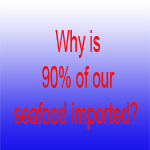
 |
 |
| A few environmental and sport fishing
groups have asked restaurant chefs and consumers to stop buying swordfish
from the North Atlantic in order to "give them a break". Their hearts are
in the right place – but their solution is dead wrong. They are falsely
promoting the idea that by not serving or eating swordfish, people will
somehow be saving a species of fish from extinction. Nothing could be further
from the truth.
Swordfish, like other ocean fish, are a nutritious and healthful food. Those harvested in the North Atlantic are maintained at sustainable levels through scientific management under an international treaty called the International Convention for the Conservation of Atlantic Tunas or ICCAT. An international team of ICCAT scientists monitor the swordfish stock and limits the annual catch by the over 30 nations that harvest swordfish. Under international law, any of these nations that fail to adhere to the ICAAT standards face reductions in their future harvests and punishing trade sanctions. Earlier harvests had been too high. Stricter measures, however, were adopted in 1996, and according to the National Marine Fisheries Service, the U.S. Government Agency charged with conserving marine resources, the present quotas and size limits "will reduce catches to a level that will allow for replacement and stop the decline of the swordfish stock." ICCAT directs U.S. officials to seize any undersized swordfish in the United States and to embargo swordfish imports from any nation violating ICCAT requirements. The boycott second guesses the judgement of the world’s top swordfish scientists and gives the false impression that we are the only nation that consumes swordfish. The fact is, most swordfish are caught and consumed by other nations. Because we share them, strict international catch limits backed up with official embargoes targeted against outlaw fishing fleets are the best way to conserve swordfish. No longer buying or serving swordfish would only hurt American fishing families. U.S. commercial fishermen depend on the Atlantic swordfish fishery for their livelihood and they supported the successful efforts of U.S. officials in obtaining the present strict ICCAT requirements. They are fishing under these limits because they know they will ensure the long-term health and abundance of the swordfish. A boycott rewards their efforts with economic hardship. Restaurateurs, however, can help by committing themselves to using only those swordfish that meet international standards. Ocean Trust, a foundation dedicated to the conservation of the world’s oceans is sponsoring a "Swordfish Conservation Initiative," which asks for such a commitment from swordfish harvesters, wholesalers and retailers. This campaign directly addresses the need to conserve swordfish, without punishing the fishermen who have already done so much to preserve the species. The National Fisheries Institute is a non-profit trade association representing more than 1,000 companies involved in all aspects of the fish and seafood industry. The Institute also acts to ensure an ample, sustainable and safe seafood supply for consumers. The commercial seafood industry directly employees more than 250,000 people and contributes more than $41 billion to the economy which includes $27.8 billion in expenditures at foodservice establishments and $13.2 billion at the retail level. |